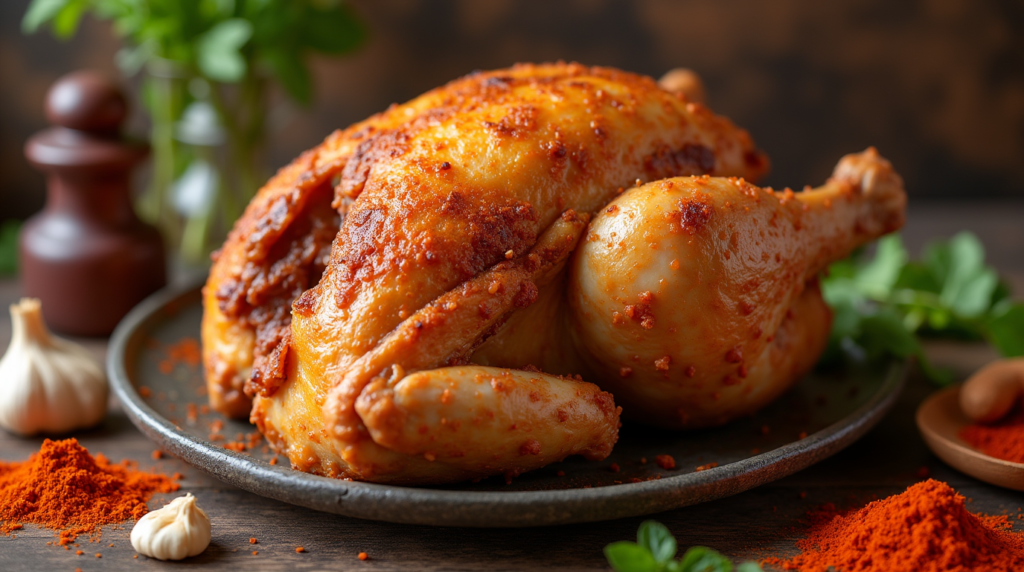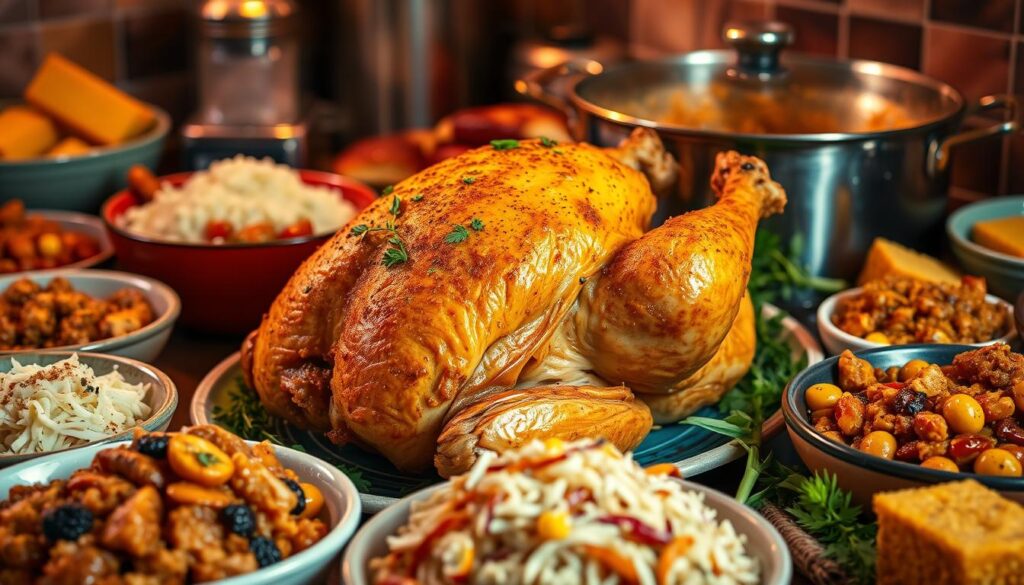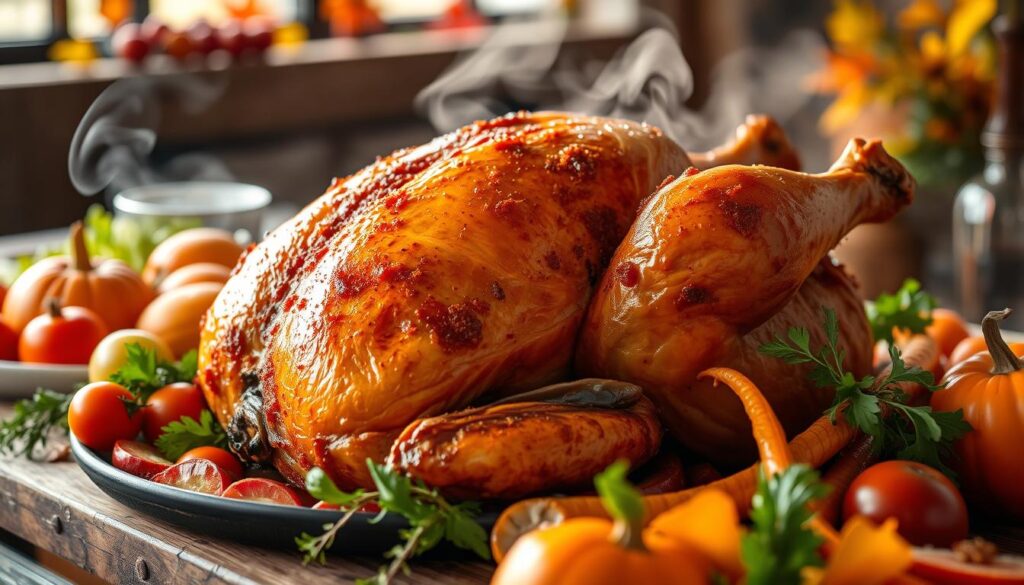Last year at Thanksgiving, the smell of a perfectly fried turkey filled the air. It was amazing and made us all excited for our first bite. This experience changed how I think about Thanksgiving turkey. If you want to make your turkey better, this deep-fried turkey recipe is perfect.
Key Takeaways
- Frying a turkey takes only 1 hour, significantly faster than traditional roasting methods
- Proper safety precautions and equipment are essential for a successful deep-fried turkey
- Injecting the turkey with a flavorful marinade enhances the overall taste
- Maintaining the optimal oil temperature of 375°F is crucial for achieving a crispy exterior
- Allowing the turkey to rest for 20 minutes before carving ensures a juicy, tender interior
What You Need for a Perfect Deep-Fried Turkey
To make a deep-fried turkey, you need more than just a turkey and hot oil. You’ll want a crispy outside and juicy inside. Here’s what you need for a great deep-fried turkey feast.
Equipment Essentials
The turkey fryer is the heart of your deep-fried turkey. An electric turkey fryer, like the Butterball Indoor Electric Turkey Fryer, is best. It’s safer and easier to use than traditional methods. You’ll also need a meat injector and a probe thermometer to check the turkey’s temperature.
Recommended Oil Types
Peanut oil is the top choice for deep-frying turkeys. It can handle high temperatures without burning or tasting bad. Its mild flavor lets the turkey’s taste come through.
Choosing the Right Turkey
Choose a turkey that’s fully thawed and no bigger than 18 pounds. A bigger turkey might not fit in your fryer. Make sure to cook it for about 3 1/2 to 4 minutes per pound. This ensures it reaches a safe 165°F inside.
“The key to a perfect deep-fried turkey is having the right equipment and ingredients on hand. With the proper tools and a bit of preparation, you’ll be well on your way to a crispy, juicy masterpiece.”
Preparing Your Turkey for Deep-Frying
Before you can enjoy a deep-fried turkey, you need to prepare it right. First, make sure the turkey is thawed completely. It takes about 24 hours of thawing for every 4 pounds of turkey. After thawing, dry the turkey well, inside and out, with paper towels.
Brining for Extra Flavor
Brining isn’t required but it makes the turkey taste better. Mix water, salt, sugar, and herbs like buttermilk, black pepper, and garlic for the brine. Put the turkey in the brine and chill it for 12 to 24 hours, depending on the turkey’s size.
Marinades and Seasonings
Marinades add great flavors to your turkey. Combine oil, water, lemon juice, and Worcestershire sauce with seasonings like paprika and garlic salt. Inject this marinade into the turkey for even flavor. For a crispy skin, rub the outside with the same seasonings.
“The key to a perfectly cooked deep-fried turkey is in the preparation. Taking the time to properly thaw, brine, and season your bird will ensure a juicy, flavorful result every time.”
The Deep-Frying Process Explained
Getting your deep-fried turkey just right takes careful attention. To make sure it’s crispy on the outside and juicy inside, let’s go over the important steps.
Heating the Oil: What You Need to Know
First, heat your oil to 375°F. Then, lower the heat to keep it at 325°F while cooking. This temperature is key for a golden brown outside and a tender inside.
Safely Lowering the Turkey into the Oil
When you’re ready, slowly put the turkey into the hot oil. Be careful to avoid splashes. Use a sturdy hook or pulley to lower it safely.
Timing Guidelines for Cooking
- Cook the turkey for 3-4 minutes per pound, making sure it reaches 165°F inside.
- Use a probe thermometer to check the temperature. Adjust the heat to keep it at 325°F.
- After cooking, let the turkey rest for 20-30 minutes. This makes it juicy and flavorful.
“Patience and attention to detail are key when deep-frying a turkey. Take the time to heat the oil properly and carefully lower the bird into the hot oil for the best results.”
By following these steps, you’ll make a delicious, crispy, and juicy deep-fried turkey. It’s sure to impress your family and friends.
Flavorful Seasoning Blends
Make your Cajun fried turkey or Southern-style fried turkey taste amazing with tasty seasoning blends. You can try classic Cajun spices or something new like lemon pepper. There are so many flavors to choose from for your deep-fried turkey.
Popular Spice Mixes for Deep-Fried Turkey
- Cajun Seasoning: A mix of paprika, garlic powder, onion powder, cayenne pepper, black pepper, and oregano for a bold, Cajun-inspired kick.
- Lemon Pepper: Combining lemon zest, black pepper, and other aromatic herbs for a bright, citrusy twist.
- Poultry Seasoning: A classic mix of sage, thyme, rosemary, and other savory herbs to complement the natural flavors of the turkey.
Utilizing Injection Marinades
Inject your turkey with a flavorful marinade for maximum moisture and taste. These marinades mix oil, butter, herbs, and spices to get deep into the meat. Try a mix of melted butter, Cajun seasoning, and garlic for a truly indulgent fried turkey.
Creating Your Unique Blend
Try making your signature seasoning by mixing garlic powder, onion powder, paprika, chili powder, and a bit of brown sugar. You can create the perfect flavor for your Cajun fried turkey or Southern-style fried turkey.

“The key to a delicious deep-fried turkey lies in the seasoning. Infuse it with bold, Cajun-inspired flavors or keep it classic with a fragrant poultry blend – the choice is yours!”
Safety Tips for Deep-Frying
As the smell of a deep-fried turkey fills the air, safety is key. Making a delicious and crispy turkey needs careful steps to avoid dangers. Follow these fried turkey safety tips and deep-frying precautions for a safe and fun Thanksgiving.
Essential Safety Gear
Start by getting the right safety gear. Get heat-resistant gloves that can handle up to 500 degrees Fahrenheit. Also, wear protective goggles to keep your eyes safe from oil splatters.
Avoiding Common Hazards
Make sure your turkey is fully thawed and dry before frying. Moisture can cause oil splatters. Also, don’t fill the fryer too much to avoid oil spills and fires.
What to Do in Case of an Emergency
Always have a fire extinguisher for grease fires (Class K or B) ready. If a fire happens, turn off the heat and use the extinguisher to put out the flames. Never use water to fight an oil fire, as it can make the fire worse.
By following these fried turkey safety tips and deep-frying precautions, you can enjoy a tasty deep-fried turkey safely. With the right safety steps, your Thanksgiving dinner will be a hit.
Serving Suggestions
Make your deep-fried turkey even better by adding tasty sides and drinks. These choices will make your meal balanced and delicious. Your guests will love it.
Best Sides to Complement Deep-Fried Turkey
- Creamy mashed potatoes
- Savory cornbread stuffing
- Roasted Brussels sprouts with bacon
- Green bean casserole
- Sweet potato casserole with marshmallows
Recommended Sauces and Dips
Add flavor to your turkey with tasty sauces and dips. Try a tangy cranberry sauce and a smooth turkey gravy. They’ll make the turkey even juicier.
The Perfect Beverage Pairings
Choose drinks that match the turkey’s rich taste. Serve crisp Chardonnay or Sauvignon Blanc wines. Or, offer beers with caramel or citrus notes. They’ll balance the meal perfectly.
With the right sides, sauces, and drinks, your Thanksgiving feast will be unforgettable. Your deep-fried turkey will be the star of the show.
Tips for Leftover Deep-Fried Turkey
Deep-fried turkey is a Thanksgiving favorite. But what to do with leftovers? We’ve got tasty ideas to enjoy your leftover turkey.
Reheating Methods for Maximum Flavor
To keep your turkey crispy, use the oven. Place slices on a baking sheet and heat at 350°F for 10 minutes. This method keeps the turkey juicy and crispy.
Creative Recipes Using Leftovers
- Make turkey pot pie or turkey tetrazzini. These dishes are comforting and delicious.
- Create turkey sandwiches with cranberry sauce, brie, and artisan bread. It’s a tasty treat.
- Try a turkey salad or turkey noodle soup. These dishes offer a lighter take on deep-fried turkey.
There are endless ways to use leftover turkey. With a bit of creativity, you can turn it into something new and exciting.
“The best part about deep-frying a turkey is all the incredible leftover recipes you can create. I love turning those crispy bits into a hearty turkey pot pie or a flavorful turkey noodle soup.”
Keep leftover turkey in airtight containers in the fridge for 4-5 days. With a little planning, you can enjoy your Thanksgiving turkey long after the holiday.
Deep-Fried Turkey Variations
Explore new flavors for your deep-fried turkey. Try classic Cajun seasoning or international twists. There’s a turkey recipe for every taste.
Cajun-Style Deep-Fried Turkey
Bring the Bayou’s bold taste to your Thanksgiving. Rub the turkey with cayenne pepper, paprika, garlic powder, and Cajun seasoning. This mix adds a peppery kick to the crispy skin and juicy meat.
Asian-Inspired Seasonings
Try an Asian-inspired turkey for a unique taste. Marinate the turkey in soy sauce, rice vinegar, sesame oil, and five-spice powder. This blend creates a memorable flavor experience.
Herb-Infused Options
Enhance your turkey with fresh herbs. Rub it with rosemary, thyme, and sage before frying. These herbs add a classic, savory taste that complements the crispy skin.
Find your favorite deep-fried turkey flavor. Whether it’s Cajun spices, Asian seasonings, or herbs, there’s a perfect option for you.

“The secret to a truly exceptional deep-fried turkey lies in the seasoning. Don’t be afraid to step outside the box and try new flavor combinations.”
Troubleshooting Common Issues
Cooking a deep-fried turkey can be fun, but it comes with its own set of challenges. If your turkey skin isn’t crispy or the oil temperature keeps changing, don’t fret. We’ve got solutions for common deep-fried turkey problems.
Why Isn’t My Turkey Crispy?
Getting that crispy skin on your turkey is key. Make sure the oil is at the right temperature, around 325°F. Use a good thermometer to check the oil and adjust it if needed.
Also, dry the turkey well before frying. Any extra moisture can stop the skin from getting crispy.
Handling Oil Temperature Fluctuations
Keeping the oil temperature steady is crucial for even cooking. If the temperature swings too much, your turkey might not cook right. Watch the temperature closely and adjust the heat to keep it between 325-375°F.
A quality thermometer is essential for deep-frying success.
Fixing an Overly Salty Turkey
Even with careful seasoning, sometimes the turkey can be too salty. If this happens, don’t worry. You can balance the flavor by serving the turkey with unsalted sides like mashed potatoes or stuffing.
You can also make a light, unsalted gravy to drizzle over the turkey. This will help counteract the saltiness.
By tackling these common issues, you’ll be on your way to making a crispy, juicy, and flavorful turkey every time. Remember, paying attention to detail and using the right tools are crucial for deep-frying success.
Frequently Asked Questions
Exploring deep-fried turkey brings up common questions. We’ll tackle a few key ones to help you have a safe and tasty turkey frying experience.
How Long Should I Fry a Turkey Per Pound?
For deep-frying a turkey, cook it for 3-4 minutes per pound. A 10-pound turkey needs about 30-40 minutes. Always use a probe thermometer to check the internal temperature. It should hit 165°F for it to be safe to eat.
Can I Use a Frozen Turkey?
No, don’t deep-fry a frozen turkey. It must be fully thawed first. Trying to fry a frozen turkey can cause oil splatters and uneven cooking. Make sure your turkey is thawed in the fridge before frying.
Is Deep-Frying Bad for You?
Deep-fried turkey has more calories and fat than roasted turkey. But, it can be a tasty treat in small amounts. Just be careful with portion sizes. With safety and quality ingredients, deep-fried turkey can be a great holiday dish.
Conclusion: Enjoying Your Deep-Fried Turkey
Deep-fried turkey is a tasty twist on the usual roasted turkey. It has a crispy outside and juicy inside. With the right steps and safety tips, it can become a beloved holiday tradition.
Final Thoughts on the Cooking Process
At first, deep-frying might seem scary. But with the help of this article, you can learn to do it well. Cooking a perfect deep-fried turkey will impress your guests and make your holiday dinner special.
Celebrating with Friends and Family
Deep-fried turkey is more than just food. It’s about sharing moments with your loved ones. It’s perfect for Thanksgiving or any holiday get-together. Your deep-fried turkey will be the star that brings everyone together.
FAQ
How Long Should I Fry a Turkey Per Pound?
Can I Use a Frozen Turkey?
Is Deep-Frying Bad for You?
What Equipment is Essential for Deep-Frying a Turkey?
What Type of Oil is Recommended for Deep-Frying a Turkey?
How Do I Choose the Right Turkey for Deep-Frying?
How Do I Prepare the Turkey for Deep-Frying?
What are Some Common Safety Concerns When Deep-Frying a Turkey?
What are the Best Sides and Drinks to Serve with Deep-Fried Turkey?
How Can I Reheat and Use Leftover Deep-Fried Turkey?
Source Links
- https://grandbaby-cakes.com/fried-turkey-recipe/ – Perfect Fried Turkey (How to Fry Turkey)
- https://soulfoodcooking101.com/the-best-fried-turkey-how-to-deep-fry-a-turkey/ – The Best Fried Turkey: How to Deep Fry a Turkey
- https://www.webstaurantstore.com/article/166/how-to-deep-fry-a-turkey.html?srsltid=AfmBOopFNb8z6rKc-CinE_zpsjIAPL7bho97_-YdiJwOkRqzmKEcfa3A – How to Deep Fry a Turkey
- https://www.savoryexperiments.com/how-to-fry-a-turkey/ – How to Fry a Turkey – Step-by-Step Fried Turkey Recipe
- https://ohsodelicioso.com/how-to-fry-the-best-in-the-world-turkey/ – The Best Fried Turkey
- https://www.aspicyperspective.com/fried-turkey-recipe/ – Deep Fried Turkey Recipe (How To Tutorial) – A Spicy Perspective
- https://www.allrecipes.com/recipe/130351/cajun-deep-fried-turkey/ – Cajun Deep-Fried Turkey
- https://www.wikihow.com/Deep-Fry-at-Home – 3 Ways to Deep Fry at Home – wikiHow
- https://rufusforreal.com/deep-fried-turkey/ – Deep Fried Turkey Recipe
- https://blog.ochsner.org/articles/6-turkey-frying-safety-tips – 6 Top Turkey Frying Safety Tips | Ochsner Health
- https://www.webstaurantstore.com/article/166/how-to-deep-fry-a-turkey.html?srsltid=AfmBOoo-XMHVDFdPu5eCfMH23chPWlzUoywBfIFjqILrHg1Buig6Yt3v – How to Deep Fry a Turkey
- https://www.chicagostarmedia.com/restaurants/skip-the-cluck-ups-safety-tips-for-deep-frying-your-thanksgiving-turkey/article_83d98456-9bbd-11ef-a9c1-9b4d8184d6f7.html – Skip the cluck-ups: Safety tips for deep frying your Thanksgiving turkey
- https://gustomeadow.com/deep-fried-turkey-sides/ – What to Serve with Deep Fried Turkey? 10 BEST Side Dishes
- https://www.bhg.com/recipes/how-to/handling-meat/how-to-deep-fry-turkey/ – Deep-Fry a Turkey for Your Tastiest Thanksgiving Ever
- https://www.delish.com/holiday-recipes/thanksgiving/g2488/leftover-turkey-recipes/ – 45 Delicious Ways To Use Up Leftover Thanksgiving Turkey
- https://www.tasteofhome.com/collection/top-10-turkey-leftovers/?srsltid=AfmBOopb07kh4mY3ZP2K3ovxjWsGMPRMJqucb4Tp8IGj-leSbzYMB7p0 – 42 Best Leftover Turkey Recipes
- https://copykat.com/how-to-make-deep-fried-turkey/ – How to Make the Best Deep Fried Turkey – CopyKat Recipes
- https://thefrugalchef.com/2024/09/how-to-deep-fry-a-turkey/ – How to Make Deep Fried Turkey – The Frugal Chef
- https://www.soulfullymade.com/deep-fried-turkey-recipe/ – Deep Fried Turkey Recipe
- https://thecaglediaries.com/deep-fried-turkey/ – Deep Fried Turkey
- https://www.bhg.com/recipes/how-to/handling-meat/safely-cook-a-turkey/ – 6 Food Safety Mistakes That Could Spoil Your Thanksgiving Turkey—And What to Do Instead
- https://www.yahoo.com/lifestyle/heres-deep-fry-turkey-without-202501002.html – Here’s How To Deep Fry A Turkey Without Catching Fire
- https://bigthink.com/starts-with-a-bang/what-happens-deep-fry-frozen-turkey/ – What happens if you deep fry a frozen turkey?
- https://tiaclara.com/breaded-fried-turkey-chops-recipe/ – The Easiest Fried Turkey Chops Recipe
- https://www.foodnerdrockstar.com/recipes/turkey-stir-fry-a-weeknight-treat – Gochujang Turkey Stir-Fry: A Weeknight Treat – Main Courses – Food nerd rockstar



